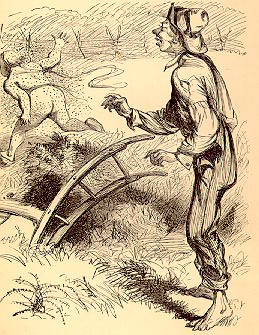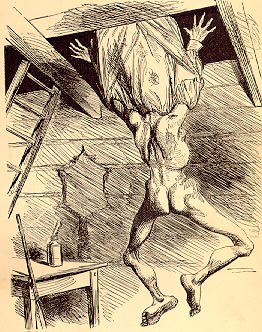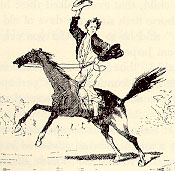
George Washington Harris became one of the most important contributors to W. T. Porter's Spirit of the Times, the weekly New York sporting paper famous for its humorous sketches. Harris is considered the greatest of Southwestern humorists before Twain. Harris' great achievement was his creation of Sut Lovingood, "a nat'ral born durn'd fool." Sut is one of the cruelest characters encountered in Southwest humor. He grossly exaggerates the qualities of coniving, cruelty, brutish behavior and coarse speech--the qualities that enable men to survive the harsh life of the frontier. In turn, respectibility, kindness, and brotherhood are characteristics for derision as they constitute the personalities of the weak. Sut furnishes the reader with a self description which should give a fair idea of the qualities this character possessed;
 |
Sut Lovingood's Daddy Playing Horse |
Every critter what has ever seed me, if they has sense enough to hide from a coming calamity...jist knows five great facts in my case...Firstly, that I hain't got nary a soul, nothing but a whisky-proof gizzard...Secondly, that I's too durned a fool to come under military law. Thirdly, that I has the longest pair of legs ever hung to any carcus, excepting only of a grandaddy spider...Fourthly, that I can chamber more corkscrew, kill-devil whisky, and stay on end, than anything excepting only a broad-bottomed churn. Fivety, and lastly, kin get into more durned misfortunate skeery scrapes, than anybody, and then run outen them faster, by golly, nor anybody.
There is very little opportunity for the reader to develop any connection with Sut in the stories. Harris uses the familiar frame narrative style, giving the reader the ability to view the story through an outside observer's point of vantage--thus enabling the reader to find Sut's cruelty humorous rather than savage. . One of his most famous exploits is in "Sicily Burn's Wedding". Sut is not invited to the "wedding" and "wer pow'fully hurt 'bout it". In order to find revenge, he slips a basket of corn around the horns of Ole Sock-- "a big black an' white bull". The bull proceeds to panic and start backing up like "a big craw-fish wif a hungry coon a-reachin fur him..." knocking all sorts of things, "at las'agin the bee-bainch, knockin hit an' a dozen stan ove bees heads over heels, an' then stompin back'ards thru the mess."
 |
Sut Lovingood's New Shirt |
Yet instead of anger toward Sut or even sympathy for Sicily--whose wedding is now a bee-hive and bull-- the reader laughs at the images and mishaps of the story. Sut's familiar excuse is the explanation of his birth,
Hit am an orful thing, George, tu be a nat'ral born durn'd fool. Yu'se never 'sperienced hit pussonally, hev yu? Hits made pow'fully agin our famerly, an all owin tu dad. I orter bust my head open agin a bluff ove rocks, an' jis' wud du hit, ef I warnt a cussed coward.In contrast to characters, like the mighty hunter, much of Sut's humor results from self criticism rather than self confidence.
Like all Southwestern humorists, Harris took advantage of his widespread reading audience to promulgate his political ideas. Harris held a strong conviction for the South and particularly the secessionist movement. Although Sut is a "nat'ral born durn'd fool" when it comes to political matters, Harris uses Sut as a political satirist in many ingenious twists of story lines. In one example, Harris made a slight variation on the familiar use of the frame narrative within Southwestern humor sketches. He wrote an article in 1856 that has Sut recount a dream of the previous night in which he is watching Buchanan, Filmore, Fremont and Seward play a game of cards in Washington, D.C.--making his opinions of these political figures very clear. Near the beginning of the Civil War Harris found another outlet to his political vehemence. He began to write stories of Sut and his meetings and travels with Abe Lincoln--who was in Harris' opinion just another "nat'ral born durn'd fool" whom Sut characterizes harshly.

